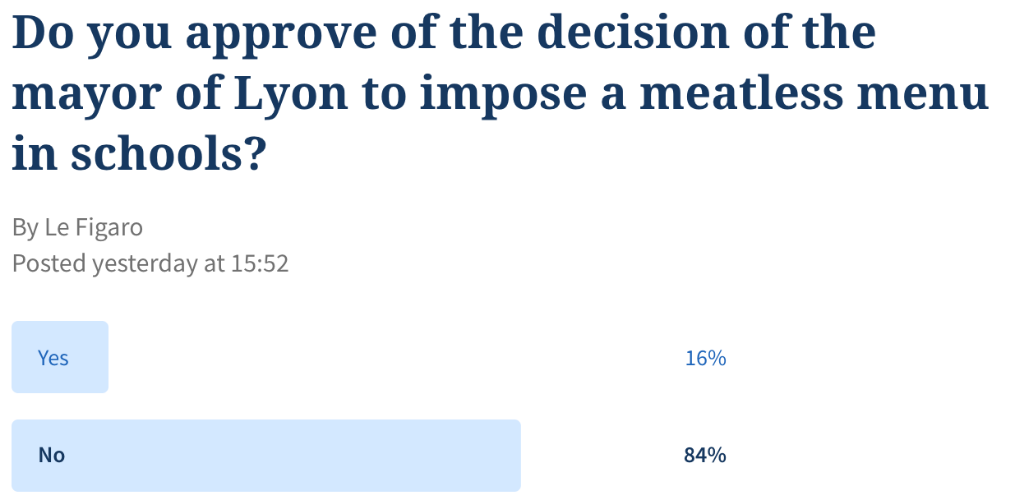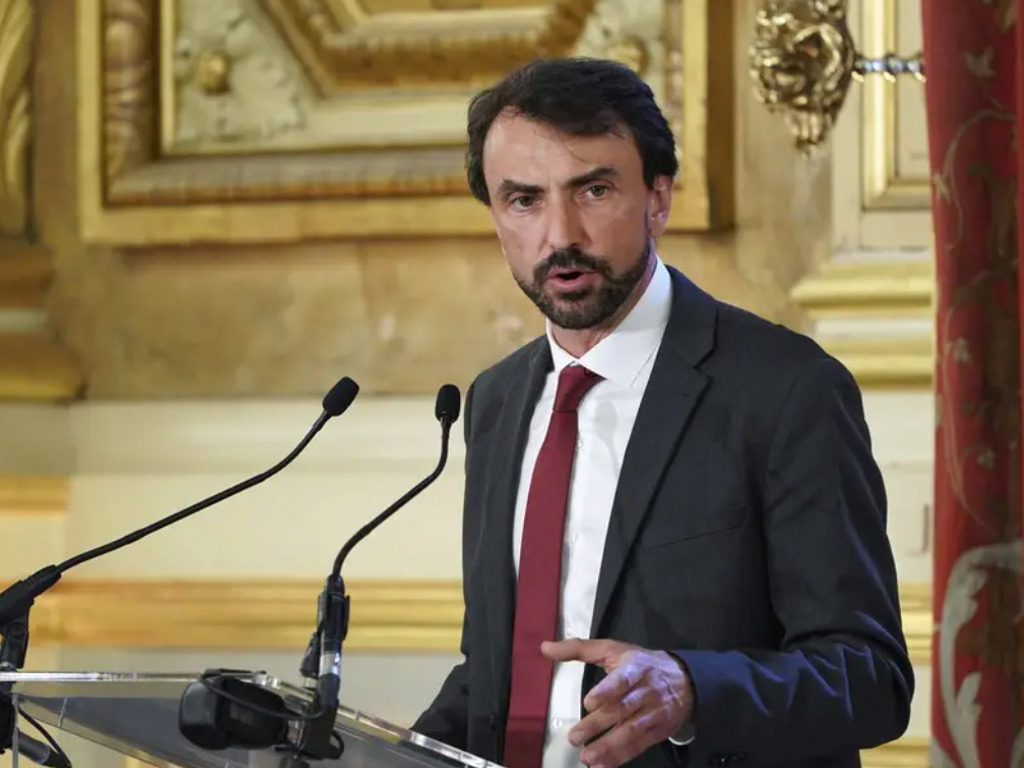4 Mins Read
The French government has accused Mayor Gregory Doucet of Lyon of showing disrespect to French butchers and putting children’s health at risk for his decision to remove meat from the menu of school lunches across the South Eastern city that borders the Rhône and Saône rivers.
Mayor Gregory Doucet of Lyon, the fourth largest city in France with a population of almost 500,000, and known as the culinary capital of the country, popular for its traditional meat-forward dishes, had decided to keep fish and eggs along with plant-based food in the menus of school lunches and drop meat options completely.
The decision has sparked outrage within the French government. On Twitter, Agriculture Minister Julien Denormandie, who tweeted: “Let’s stop putting ideology on our children’s plates. Let’s just give them what they need to grow well. Meat is part of it,” he said, adding that he had asked the region’s prefect, the state-appointed top local official, to overrule this decision.
Interior Minister Gerald Darmanin said it was an ‘unacceptable insult’ for French farmers and butchers. “We can see that the moralising and elitist policy of the Greens excludes the popular classes. Many children often only get to eat meat at the school canteen.”
According to French radio, parents were also outraged. A poll by right-wing newspaper Le Figaro which surveyed 116,000 of their readers, showed that the French population is not ready to ditch beef just yet. The revelatory results show that a whopping 84% said they disagree with the mayor of Lyon’s decision to remove meat from school lunch menus.

Mayor Doucet, who was one of several green politicians to win control of major cities in last year’s local elections, hit back on Twitter, saying that the measure has been taken “solely” due to the health crisis as he wanted to have a single menu without meat options thus facilitating a smooth service at lunchtime with the social distancing rules properly followed.
He continued to point out that his right-wing predecessor, mayor Gerard Collomb had taken “exactly the same measure” during the first wave of the pandemic and that the menu, which includes fish and egg products was “balanced for all our schoolchildren”.
Matthieu Vincent, founder of DigitalFoodLab and a Paris-based food tech expert shared his reaction to the uproar with Green Queen: “I think Lyon’s mayor is willingly adding fuel to an existing fire to sustain its political stand. The debate was already raging before the pandemic about vegetarian meals in the schools as some see it as an attempt on secularism. Even if I think that children should be educated about meat alternatives, I don’t like the idea to impose it.”
Vincent added that the move may cause more damage than good in the long run: “By removing meat unilaterally, it creates a risk of many people feeling that their traditions are under attack. And hence, to create a state of denial where they simply refuse to hear about plant-based and other alternative.”
In December of last year, in response to the news about the regulatory approval for cell-based food products by the Singapore government, Denormandie tweeted that France will not agree to the commercialisation of cultivated meat, which seems an excessive reaction given that a recent study show a rising acceptance of cultured meat, with nearly half (44%) of French consumers willing to try cultured meat, in contradiction to Denormandie’s claims that suggest the opposite, as consumers are accepting and understanding the health, sustainability and food security advantages of cell-based proteins.
Denormandie wrote in French (Green Queen translation): “Is this what we want for our children, as a society? Me, no! I will clearly state it: meat comes from the living, not laboratories. You can count on me, in France, meat will remain natural and never artificial!”
Alternative protein experts have criticized the minister’s comments and highlighted the need to transform the protein supply chain, thus shifting away from traditional animal agriculture to mitigate the effects of climate change and prevent future zoonotic pandemics with scientists observing that a mass switch to plant-based proteins and elimination of meat and dairy products could help remove more than a decade of emissions.
And while other governments look to strengthen the food production in their country to protect it from shocks caused by the pandemic and the climate crisis (see Denmark’s new carbon-friendly dietary guidelines), earlier this month Denormandie outlined France’s new ‘food sovereignty’ plan, which instead of supporting alternative protein innovations, is committed to upgrading soybean and protein crops to reduce reliance on livestock feed imports – a move that will benefit the carbon-intensive animal agriculture industry and runs counter to the E.U. pledge to build a more sustainable food system.
The outspoken agricultural minister told Reuters in an interview: “We have one objective: regain some of our food sovereignty. Our target today is clearly soybean imports coming from the American continent.”
As part of the plan, France will be increasing the number of protein-rich crops by growing it by 40% in 2022 and double the figure within 10 years in its new self-sufficiency plan and this means that there will be no support within the food sovereignty plan to utilize any of the protein-rich crops for developing plant-based alternative meats.
Denormandie recently also stirred controversy when he led a new draft bill easing the ban on bee-threatening pesticides, a move that supports the country’s sugar industry, irrespective of the environmental impacts on devastating pollinator populations, of which almost three-quarters of the world’s crops depend on.
Lead image – Lyon’s Mayor Gregory Doucet, courtesy of L. Cipriani / Sipa.




